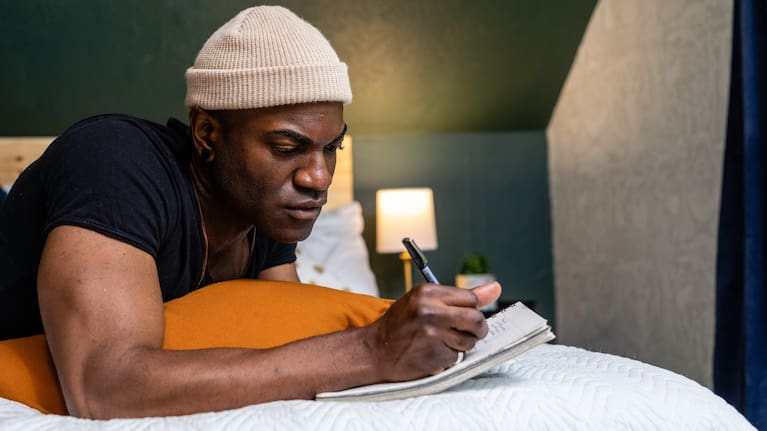Frances Cook explains how to foster a wealthy state of mind, even in a rough economy.
Controversial but true, feeling rich can sometimes be more about psychology than dollars and cents.
This isn’t to say that money doesn’t have a very real, genuine impact on our lives. It’s just that combining the numbers of money, with the mindset, will put you much further ahead than trying to work off just numbers alone.
There are people with seven-figure portfolios who still feel poor (unbelievable, but true); and others who earn below the national median but feel deeply secure and satisfied.
So what’s going on?
You can get a lot of “richness” from how you design your life, rather than focusing on the zeros on your payslip. It's an especially important skill while we’re in a rough economy.
So at a time when the paycheck isn’t stretching as far as it was, how do we bring the richness in, in other ways?

Why your brain plays tricks on you
Humans are wired to compare. Psychologists call it relative income, meaning it’s not about how much you earn, it’s about how much you earn compared to the people around you.
That’s why a $100,000 salary can feel rich in a small town, but not in a flash Auckland suburb where your neighbour’s Tesla makes your Toyota look shabby.
The trouble is, comparisons never end.

There’s always someone with a bigger house, fancier job title, or better-curated Instagram feed. If you chase that dragon, you’ll never feel rich, because your brain will keep moving the goalposts.
Money is security, not status
Financial psychologist Brad Klontz has researched how guilt and shame sabotage financial progress.
But he makes another good point: money is at its best when it buys peace of mind. That’s a very different goal from status.
Peace of mind is the buffer that lets you take a breath when the car breaks down. It’s the savings that let you say no to a toxic boss. It’s the sense that future you has a safety net.
Klontz’s research shows that many of our money decisions aren’t rational, they’re emotional.
We overspend because we’re stressed. We save less because we’re scared to even look at the numbers.
We tell ourselves stories, often inherited from childhood, about what our finances “should” look like.
It’s why a wealthy person can still feel broke, while another person else with modest savings might feel calm and content. One might be chasing status, the other has built security.

Design your rich life, your way
I’m lucky enough to spend a lot of my working days talking to people who’ve built financial independence, and picking their brains for the tips that can work for normal people.
For those who achieve this on a normal income, there’s obviously a lot of dedication required to live frugally, invest solidly, and still find joy in life while working towards a big goal.
What always comes up, without fail, is the requirement to decipher what actually brings happiness to your life. And to find ways to achieve that for as little money as possible.
The sports fans start volunteering at sports events. The family-focused find a job with flexible hours, so they can take the kids to school without sprinting to the office.
The psychology here is key: if you know what your rich life looks like, you can build a plan that will help you live that life.
If you don’t, you risk chasing someone else’s definition of happiness forever.

The gratitude effect
One of the simplest, yet most overlooked hacks to feel richer, is gratitude.
Which is understandable, when there are genuine reasons to be feeling the pinch. Still, there’s also genuine science behind why something that sounds so fluffy, can be so powerful.
No, gratitude won’t magically pay the bills. But it can change the way you feel about money, which in turn changes your behaviour.
People who feel good about their finances are more likely to make long-term decisions, invest steadily, and avoid panic-spending.
When you stop and notice what’s already working, like the warm house, the Saturday coffee, or the friend who always picks up the phone, you shift from scarcity to abundance.

Redefining 'enough'
The hardest word in finance isn’t “compound interest” or “inflation". It’s “enough.”
Because if you don’t define what enough looks like, you’ll always feel like you’re falling short.
“Enough” is the line where you have security, breathing space, and enjoyment, without burning yourself out chasing someone else’s version of wealth.
It’s also deeply personal.
For one person, enough is a modest house, paid off by the age of 50.

For another, it’s a career that funds yearly travel, even if the mortgage takes longer.
For others, it can be living simply and buying back your time.
The psychology of enough is powerful because it shifts you from chasing to choosing.
How to feel richer starting today
So how do you actually put this into practice? A few ideas:
- Automate a small win. Set up $10 a week into savings, so that you get progress without relying on willpower, and feel "richer" each week with minimal effort.
- Name your rich life. Write down the three things that matter most to you, whether that’s time, adventures, freedom, or something else. Use those as your north star.
- Swap comparisons for gratitude. Next time you catch yourself eyeing someone else’s car or house, list three things you’re glad you already have.

None of these steps require a pay rise. But they all help you feel richer, today.
At the end of the day, money is a tool. It can buy you things, yes. But more importantly, it can buy you freedom, calm, and choices. And mis-used, it can buy you anxiety and an insatiable appetite for more.
Feeling rich isn’t about a million in the bank. It’s about waking up without dread, knowing you can handle what life throws at you, and having the space to enjoy the moments that matter.
The information in this article is general in nature and should not be read as personal financial advice.





















SHARE ME